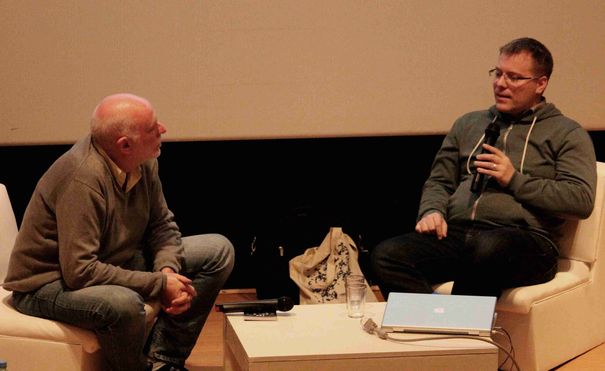The tools of the cinema of the future
Sergio Mario López of the 2013 Talent Press Buenos Aires reports from the BAFICI panel discussing the freedom and restraints of digital filmmaking with German director Christoph Hochhäusler.

The panel How Do You Find Or Lose Freedom With New Technologies with German filmmaker Christoph Hochhäusler and Argentine film critic Quintín.
The panel titled How Freedom Is Found Or Lost With The New Technologies took place within the frame of the 8th Talent Campus Buenos Aires. Christoph Hochhäusler, German filmmaker and critic, encouraged assistants to think about the future of filmmaking based on four technological advances he predicts lie in the future ahead. What follows is a brief review of this (almost sci-fi) panorama.
One. With the development of cameras capable of registering the totality of actors' performances, filmmakers will not have to plan the shooting of angles and frames: any kind of shot will be possible to obtain in postproduction. This is the first advantage. They will also be able to create complex shots from these recordings, as if these were palimpsests. Every 30 years, Hochhäusler recalls, the concept of realism in film changes, and that change is concurrent to an advance in technology.
Two. In a not so distant future and with the refinement of possibilities already existent in the internet search engines, filmmakers will have access to the biggest audiovisual archive in history. It is worth mentioning that the laws of copyright will not be equal to those we have nowadays. What are the benefits brought about by this access to the whole of film memory? This will avoid the proliferation of déjà vu shots as well as the use of other readymades. Hochhäusler dreams that in the future filmmakers will have to concentrate on those two or three scenes that prevail on films, those scenes that survive oblivion, that manage to break free from the grammar of film.
Three. Portable high-definition cameras make it possible to produce high quality images in the same place where events occur. Filmmakers will be able to have audiovisual diaries and store material for future jobs, without compromising the quality of their projects. In the future not all of us will be filmmakers, as can be derived from this point. But those who will, will do it full-time, all year round.
Four. This point is related to the other and is, as the German director makes out, the least clear. Working with universal archives and archives of one's own, and the leaps and grammatical "shortcuts", will lead film language towards abstraction, something Hochhäusler already perceives in some contemporary documentary films.
Hochhäusler's research is motivated by the problems he faces when filming. And even though these technologies appear on the horizon as possible solutions, technological advances and the future are not synonyms of escalating and linear progress. Nor do they mean we have to reject the past: in Hochhäusler's exhibition the names of classic American filmmakers like Walsh or Hawks appear, as well as of time travellers like Marker or Mekas.
Film was, is and will be a product of the interaction among technological devices, creators and their world(s). The future brings tension, dilemmas and contradictions to this relationship. But Hochhäusler also considers the audience, the communicational aspect of film. Hence his reflection includes a position of surveillance towards the hypothetical uses of the upcoming technologies. Film language must be pushed to new levels and must take full advantage of technological developments, but it will always be a shared journey.

